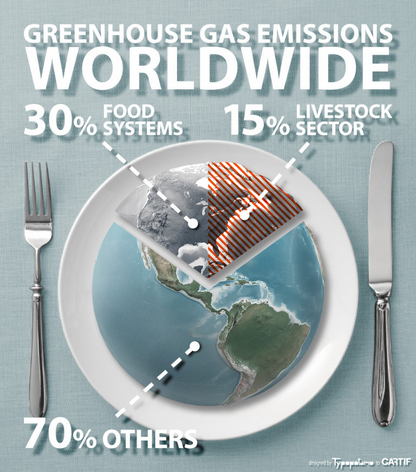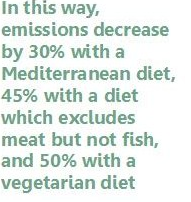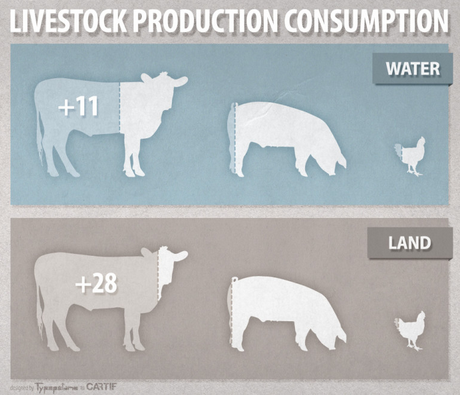From November 30 to December 11 was celebrated Paris the COP21, the twenty-first conference on climate change. One of the objectives of this summit was to reach agreements between the participating countries, which allowed limit global warming to a level below 2 ° C.

When we consider man’s contribution to climate change, in particular emissions of greenhouse gases, we are thinking about the big electricity companies, energy production or emissions from transports, but our diet and the way in which we consume our food have an important role in contributing to climate change.
Food systems worldwide are responsible for up to 30% of all greenhouse gas emissions. (FAO). Furthermore, 2050 is forecast population growth, which will require an increase in agricultural production and will therefore increase pressure on natural resources.
We must find a more sustainable way of feed the world, looking healthier diets and friendly nature. Recently Chatham House (Royal Institute of International Affairs), non-governmental non-profit organization that works to build a sustainable world, has published a report which concluded that a diet change is needed to reduce global warming.

In this report, it is concluded that we keep too carnivorous diets, which contribute directly to global warming and that the livestock sector is responsible for 15% of greenhouse gas emissions. The meat is the least efficient food exists to feed the planet, the amount of arable land that is dedicated, limiting itself to other crops, and by the enormous expense involved water per kilo of meat produced.
Reduce meat consumption could reduce gas emissions by 25%, and switching to Mediterranean diets based on fish or vegetarian would have a considerable reduction in these emissions.
Accordingo to Gidon Eshel, the beef uses 28 times more land and 11 times more water than production chicken or pork. And compared to the production of potatoes or rice, the impact of beef per calorie, used 160 times as much land, besides the greatest emissions of greenhouse gases.

David Tilman, ecologist at the University of Minnesota, says that “global emissions of greenhouse gases would be reduced by an amount equivalent to the current emissions of all cars, trucks, trains, ships and airplanes. Moreover, this change in diet could prevent the destruction of tropical forests and savannas of a size equal to half of the US “
We must be aware of the impact our everyday actions have on greenhouse gas emissions, to make sustainable environmental choices. Choices to the time of making the shopping will be from now essential, if we want a sustainable planet for all, to feed the whole population (currently around 900 million people go hungry each day) and respect all living organisms.
Much of consumers think that the greatest effect of food contaminants, are the packaging and not the food itself. From now on, they will be necessary awareness campaigns, to inform consumers of the importance of the diet on the climate change.
We must walk towards more sustainable food systems, with less impact on the environment, acquiring the healthier diet patterns, that prevent diseases such as type II diabetes, obesity, cancer and cardiovascular diseases associated with diet.
- Fermentation, travel partner - 5 July 2024
- A pilot experience with a constructed wetland - 23 August 2018
- Plastic planet - 3 July 2018
